|
The Hellenic Genocide
Quotes from historical documents and related Photos. |
|||
CHAPTER XXI: "One of the most important reports connected with the fire is that of the Reverend Charles Dobson, British chaplain of Smyrna, and a committee of prominent Englishmen, all inhabitants of the district, including the British chaplains of Bournabat and Boudja. This report throws the responsibility of the fire upon the Turks, "whose fanatic elements, fed by the license of three-days’ looting, fired the city in the hope of driving out the non-Moslem and non-Jewish elements." Such a report from such a source, leaves no doubt as to the fact that Smyrna was burned by Turks, although these gentlemen do not take into account the circumstance that the town was in complete control of Khemalist troops at the time and that regular soldiers of the Turkish army, in uniform, were seen by abundant witnesses to set the fires. It is pertinent in this connection in that it relates incidents of greater ferocity than I have yet given, but which I refrain from quoting. (The entire report can be found in the "Gibraltar Diocesan Gazette", No. 2, vol 6, November, 1922.)" CHAPTER XXIII: "CONCERNING the manner in which the Turk has always profited from the conflicting interests and jealousies of Christian powers, Lord Morley made the following shrewd remark years ago: "This peculiar strife between Ottoman and Christian gradually became a struggle among the Christian Powers of Northern and Western Europe to turn tormenting questions in the East to the advantage of private ambitions of their own." This comment of the famous Englishman was voiced before the full dawn of the Petroleum Age, and while as yet America’s chief interest in Turkey was the protection of a few missionaries." CHAPTER XXIII: "A brief review of the political situation, which afforded the Turks unbridled license to "raise the hand of violence," is here necessary. It will be evident that they have again profited by their well-known policy of exploiting the dissensions and conflicting interest of Christian powers. They have been as sensitive as a barometer to the least sign of dissension among European governments or peoples, and have shown extraordinary shrewdness in provoking or augmenting it. The Turk was the ally of the Germans during the Great War, and perhaps his most useful one." CHAPTER XXIII: "In the course of this sad history, Christians were armed against their hereditary oppressors and then left to the vengeance of the latter. In general, they were abandoned, as no Christian power desired to offend the Turk, from whom great benefits were expected, to be in turn showered on the subjects of the power that showed itself most Turkophile. The United States did not abstain from this gruesome competition. In the beginning, interest prompted the spread of what came to be a well-nigh universal pro-Turk propaganda in Christian countries. When the fearful death harvest of this sinister sowing began to be reaped, fear of popular indignation and disapproval gave rise to a policy of suppression of the truth and to anti-Christian propaganda." CHAPTER XXIV: "Many stories were told also of Italian efforts to win the affections of the Turk. In any case, it is certain that bands of Turkish marauders were in the habit of crossing the line from the Italian zone and of attacking and killing Greeks, after which they would take refuge with the Italians, where they could not be pursued. The statement that the Turks received munitions and many arms from Italian shippers was persistently repeated, and has never been successfully refuted." CHAPTER XXIV: "But, the point is, her attitude contributed to the Greek defeat, the burning of Smyrna and the final destruction of the Christians of Asia Minor. Much valuable Italian property was destroyed as well as that of others. An aftermath of Italian antipathy to Greece may be seen in the bombardment of Corfu and the seizure of the island by the Italian fleet on August 31, 1923." CHAPTER XXV: "We are, nearly all of us (French officers) for the Khemalists and against the British and the Greeks." Though this is the opinion of a single individual, it expresses pretty clearly the general French attitude of mind as shown by French policy since the Armistice. It is evident that the sentiments of this French officer and of his colleagues, for whom he speaks, display a keen note of discord among the Allies, helpful to the Turk even in his gruesome work of massacring Christians." CHAPTER XXV: "Professor Davis says in "A Short History of the Near East": "In August, 1922, apparently with French munitions and French counselors, the Khemalists suddenly attacked the Greek positions in Bithynia. The Greeks were in poor morale, worn out by long campaigning and miserably led. Their army was utterly routed and evacuated Anatolia with almost incredible speed. The Turks drove straight onward to Smyrna, which they took (September 9, 1922) and then burned. The world was again horrified by one of the now standardized Ottoman massacres of conquered populations."" The Hellenic Genocide Quotes from historical documents and related Photos. Previous page | Initial page | Site Map | Next page (26th of 29) |
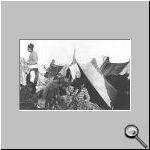
Christians being deported to the desert.
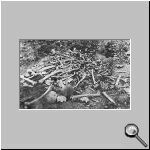
Bones of Armenians massacred at Erzingan.
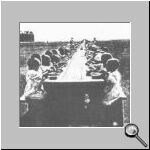
A long table for orphans.
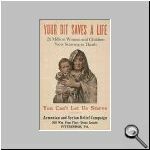
"YOUR BIT SAVES A LIFE"
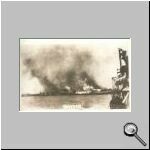
Smyrna in flames and observers.
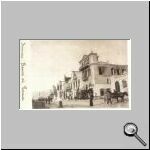
The Bank of Rome in Smyrna. Burnt.
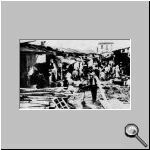
Hellenic refugees.
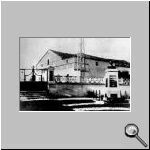
Statue of Mustafa Kemal in front of a church in Imvros.
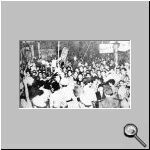
The Turkish mob celebrates the pogrom of 1955.
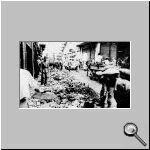
Destruction and looting of Hellenic shops.